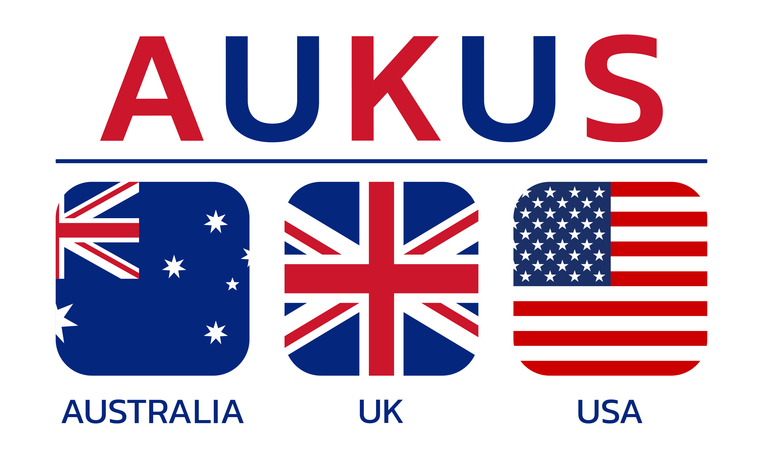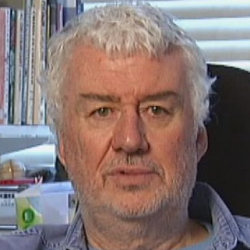A silent coup in plain sight: AUKUS and the universities
April 30, 2024
An invitation: imagine a country wherein, as a matter of policy orientation, its 41 universities have abdicated one of their principal founding roles – to be dominant sites of secular critique practised by people capable of living what they teach and committed to taking aim at the unequal, imperial, antidemocrática present. Imagine, too, that this abdication included the the need to be always self-critical and self-conscious. Finally, imagine that it was transactional: that, by their own disclosures the abdication was in exchange for becoming, explicitly and without shame, industrial brothel-keepers to the nations fevered national security imaginary. This is the frightening reality of the Australian university sector under AUKUS.
Like all coups, its genesis was initially slow, or at least not as apparent as recently revealed. In the first quarter of this year, however, three announcements leave no doubt as to the situation.
The first was seemingly a media statement of 5 February 2024 - at various levels innocuous, anodyne and ambiguous - advising that The Department of the Prime Minister and Cabinet (DPMC) had launched an independent review of Commonwealth funding for national security strategic policy work.
The scope of the review would include all Commonwealth funding to non-government organisations - including, notably in the context of this post, the universities - to conduct national security-related research, education and engagement activities.
While these programs were held to deepen public discussion, strengthen partnerships, and inform policy debates on national security matters, the review’s purpose was to ensure that they remained appropriately aligned to Australia’s national interests and strategic circumstances.
A distinguished former public servant with extensive experience in foreign policy and national security, and current Vice-Chancellor of the University of Queensland, Mr Peter Varghese AO had been selected to lead the review.
Reducing the terms of reference to what the government ultimately requires, three “core outputs” are identified. One relates to a “stocktake of relevant activities,” and another concerns recommendations to improve the delivery of the relevant activities.
Specifically and exclusively in the context of the universities, though, the third - “performance evaluation” - arouses considerable interest. The reason is that it highlights the need to report on, inter alia, “accountability, probity and transparency.”
Question: Why (especially in relation to probity)? Is this merely a pro forma inquiry, or have suspicions been aroused in the funding agencies that demand it be undertaken? If that is the case, then the relationship of the relevant activities to the respective universities’ codes of academic/intellectual integrity are immediately in play.
A proliferation of questions then arise in connection with the second announcement – this time via the publication of a pamphlet-size document entitled, The university sector’s value proposition for AUKUS: Times Higher Education Summit outcomes report (hereafter AUKUS-University Summit Report) on 11 March 2024.
To say the least, it is an extraordinary statement indicative of a mindset unbefitting any university let alone by a leading Australian university in the time of AUKUS. Unfortunately, it is also consistent with the fulsome backing given to AUKUS by Universities Australia. Taken together, they are, thus, an expression of both consent and intent.
At one level it is a mission statement, unsurprisingly produced in part from closed session summit sessions, but closely examined it is quite specifically manifesto of a concierge – a fixer who can service the special needs of management – in this case the fifteen key themes that are seen to need addressing within AUKUS in Australia.
Appropriately and without surprise the lead role was played by the US Studies Centre at the University of Sydney – an organisation that continues to masquerade as academic - but surprise is possibly warranted when the particulars are found to be of a type that question whether any university that would host it is sufficiently self-critical, self-respecting.
The “value proposition” of the universities – presumably to government and all AUKUS “stakeholders” - is that, within the “AUKUS grand strategy,” and supported by its trinational economic, political, and military resources, they will become its social engineers.
In coloration it’s pre-Copernican: the world is AUKUS-centric: as an article of faith and operation principle, there can be no doubt that AUKUS will lead to a more secure Indo-Pacific region. Notably, the universities will become the “enablers of operationalizing the strategic intent around AUKUS.”
Pillar II of AUKUS is to be the touchstone of Australia’s economic development (but the term Military Keynesianism is not mentioned).
Where doubt and dissent come to the fore, the universities will overcome popular resistance (to nuclear waste disposal for instance); provide the case for the social license; build the necessary consensus; mobilise the workforce.
If the last-mentioned requires – as it currently appears to – changing student study preferences in the STEM subjects at primary and secondary levels, and proselytising for AUKUS, the so be it. Advice to government on how this could be achieved will be forthcoming. So, too, will be advice on how to expedite security clearances for those required.
As for the universities themselves – they will have to re-orient themselves to a world of collaboration, rather than competition and yet to heightened levels of commercialisation which hitherto have eluded them in the interests of basic research.
If this appears to be the opening gambit to create a more formal military-government-industrial-academic complex, it is.
And it justifies another question. Specifically, is there a relationship between the independent (Varghese) review and the report just cited?
Those ordering the former would surely have known about the latter given that its deliberations, open and closed, took place from September to October 2023. If so, is the independent review designed to forestall the evident attempt to take over the universities (where they have not already surrendered)?
This requires a return to the term, “coup” used in the title above, but it is used advisedly and consistent with the evidence.
What I am suggesting is that there is an almost obvious link between the Varghese inquiry and AUKUS-University Summit Report especially if the DPMC had any intimations, if not the specific details of just how the universities were being subverted by foreign interests.
I subscribe to the principle that coincidence as an explanation in politics is an untenable position. Moreover, if the DPMC were not generally aware of what follows below, then it was guilty of inexcusable ignorance.
Specifically, the suggestion is that the independent inquiry is imperative in the foreknowledge that the funding of national security-related activities in the university system – and quite probably elsewhere - is dangerously out of control and has been for some time. In short it is not fit for purpose.
The nature of this subversion is found in the third detailed announcement, though published later in time, contains antecedents which act as a bridge to the second. In the form of another pamphlet-size document, and released on 18 April 2024, it is entitled, Revealed: The Pentagon’s infiltration of Australia’s universities, provides the first. It is an exemplary and extensive investigation Declassified Australia and journalism students, Stephanie Tran and Eve Cogan at the University of Technology, Sydney.
In summary form its findings – which point to the further Americanization and militarisation of the universities - include:
• The United States Defense Department has funded $394 million to Australian universities via grants and contracts since 2007.
• As of 2022, Pentagon funding to Australian universities for defence and intelligence-related research was running at $60 million per year.
• The Go8 universities have received 79% 0f these funds.
• Federal funding for higher education declined by over 46% from 1995 to 2021.
• Some of the Pentagon funding is filtered through US defence contractors such as Raytheon, Boeing, and Lockheed Martin who then subcontract to Australian universities.
• Successive Australian governments have not only backed these arrangements but also moved to accelerate higher levels of engagement between Australian universities, businesses, the research sector and what is generally known in the US as the Military-Industrial Complex.
• Australia’s Chief Defence Scientist, Tanya Munro, has stated that: “Our aim has been to align the work done in our universities and our industry. The bulk of our research and development happens in our universities, which gives us a tremendous opportunity to try to align that work to these bigger national missions”.
• Monro revealed that the Albanese government’s new $3.4 billion Advanced Strategic Capabilities Accelerator (ASCA) was modelled after, and directly shaped by American intelligence agencies.
• Apparent conflicts of interest are obvious: Belinda Hutchinson, who holds dual roles as the University of Sydney’s Chancellor and the Board Chair of defence contractor Thales Australia, has been a key figure in driving that university’s pursuit of private funding.
• There is evidence of a lack of transparency with the research collaborations between universities, government and defence contractors are often secretive, as regards the nature of the projects and amounts of funding remaining undisclosed.
Taken together, the schedule of consequences resulting from co-opting the universities to fulfil the government’s defence and national security interests – both of which are over-determined by the US in general and AUKUS in particular - are such that they constitute fundamental changes to the entire funding and pure research base of many Australian universities.
Where will the Varghese report lie in all of this? Those conducting it in relation to the universities face a system – in many cases involving profitable interlocking directorates – which are already enjoying the benefits of non-Australian Government funding under who knows what regimes of governance.
Indications are that, in some cases it is permissive to the point of outrage as evidenced by Monash University spending more than $127,000 on a lavish black-tie farewell party for outgoing vice chancellor Margaret Gardner in 2023.
Not only was this justified as consistent with spending protocols and, commensurate with the farewell of the previous Vice-Chancellor, but it took place at the same time that the university is facing a multimillion dollar wage theft claim from casual academics in the federal court.
The Varghese, then, faces a sector confident in its effrontery. That sector might – just might – bend a little in the direction of accommodation and restructuring but it’s group consciousness knows two things with certainty: that Varghese-type independent reviews come and go, but so long as AUKUS is the grail of national strategy, then the needs of the day favour the universities.
The independent report might be likened to one of Hercules labours – the cleaning of the Augean stables – successful in the short term but far from appreciated; or does it rhyme with the Cluniac Reforms of the dysfunctional 10th Century monasteries which helped give birth to the modern University but required radical reform in the direction of a disciplined, vocational life beyond today’s reigning secularism.
Reduced to one of its essentials, as I understand it, anyway, the independent review seeks to make temptation-prone organisations practice virtue against their instincts and their record.
The Council of Trent in the 16th Century, and the Reformation, speak to this and the fundamental choice available to the review - the context being that, despite earlier reforms, the monasteries (with few exceptions) were once more sites of corruption and their oppositions more strident.
The American political philosopher and historian, Garry Wills, summarised the tension in this project which has about it a cyclical quality: while the anxious Church establishment promised a future of monasteries inhabited by chaste and virtuous nuns and monks, the reformers, guided by history and the scepticism it imbued, demanded another: no more nuns and monks.

